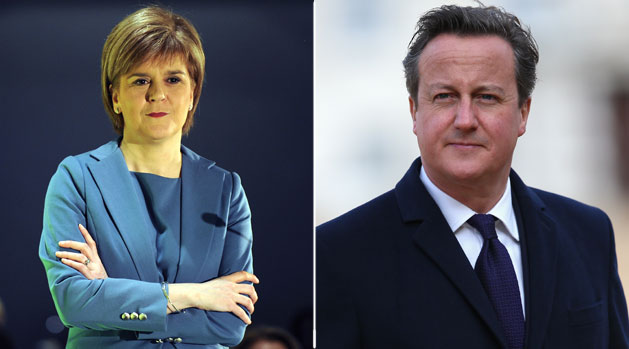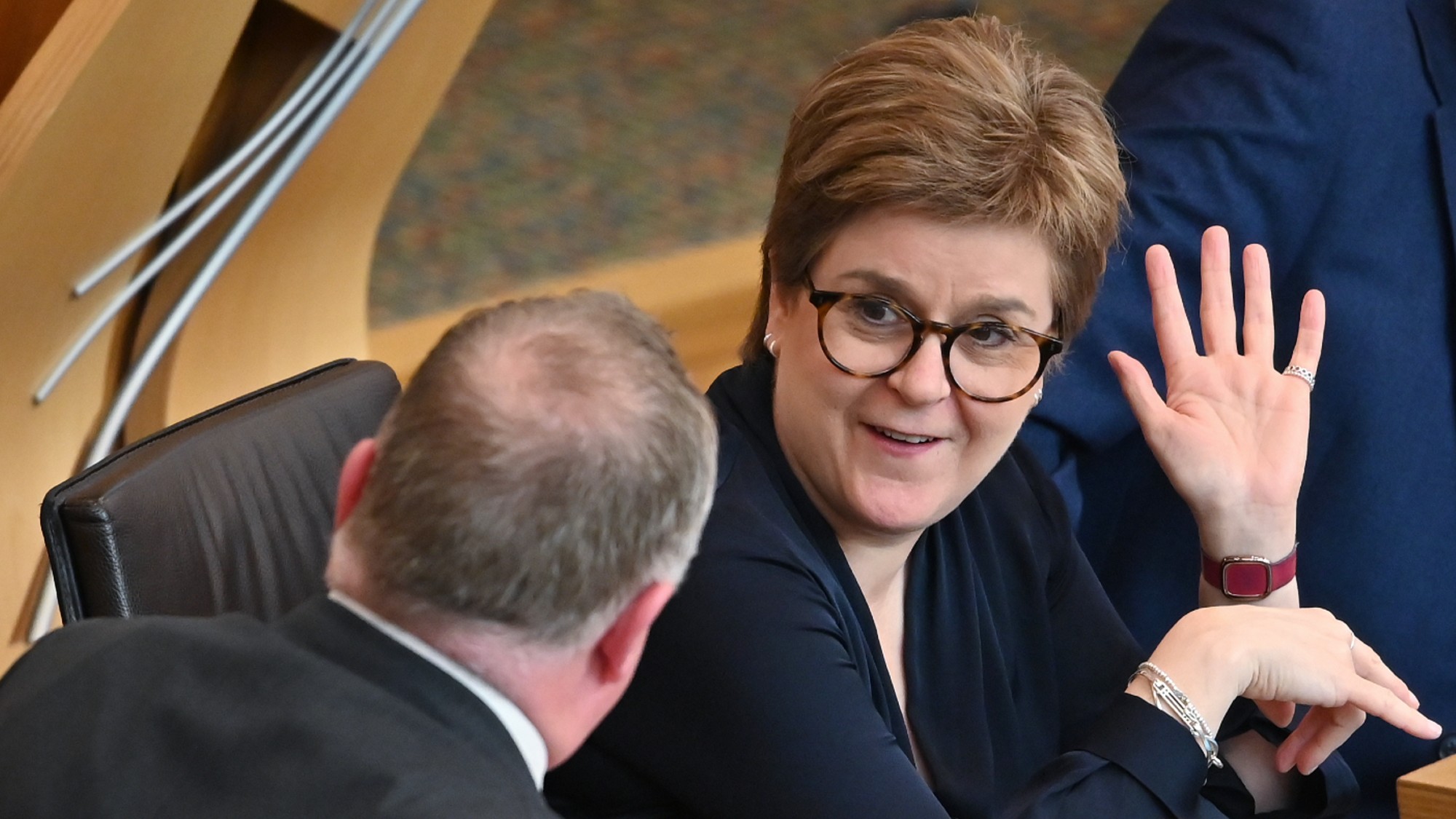Cameron in Scotland for devolution talks with Sturgeon
The two leaders were expected to clash, but the SNP leader says talks were 'constructive'

A free daily email with the biggest news stories of the day – and the best features from TheWeek.com
You are now subscribed
Your newsletter sign-up was successful
David Cameron has made his first visit to Scotland since he returned to power and the SNP won a landslide victory in the general election.
After Cameron met Nicola Sturgeon at Bute House in Edinburgh, a spokesperson for the First Minister described the conversation as "constructive and helpful".
Details of the talks have not yet emerged, but further devolution was set to top the agenda. Sturgeon had said before the meeting that it "simply cannot be 'business as usual' when it comes to Westminster's attitude to Scotland."
The Week
Escape your echo chamber. Get the facts behind the news, plus analysis from multiple perspectives.

Sign up for The Week's Free Newsletters
From our morning news briefing to a weekly Good News Newsletter, get the best of The Week delivered directly to your inbox.
From our morning news briefing to a weekly Good News Newsletter, get the best of The Week delivered directly to your inbox.
She said the proposals set out by the Smith Commission are "a good starting point" but that the election result "showed that people all across Scotland are keen to move beyond the extra powers in identified."
The commission was set up after the three main party leaders made pledges to devolve more powers to Scotland in the final days of the last year's independence referendum campaign. It recommended that powers to set income tax rates and bands in Scotland should be handed over to Holyrood.
However, Sturgeon argues that the Scottish Parliament should also have full control over welfare and employment law, as well as the ability to set the minimum wage and business taxes.
"Scotland expects these powers to be delivered, and I expect the prime minister and his government to recognise the democratic mandate that now exists to deliver them," she said.
A free daily email with the biggest news stories of the day – and the best features from TheWeek.com
Earlier this week, the SNP leader also said that the people of Scotland could demand another independence referendum if Cameron did not agree to her request for more powers, The Times reports.
"I can't impose a referendum against the will of the Scottish people, but nor can David Cameron rule out a referendum against the will of the people. It will be the people who decide," she told Scottish parliament.
But Cameron has made it clear he is not willing to go beyond the proposals set out by the commission. The PM said he that was making the trip north to "underline my commitment to our United Kingdom and Scotland's important place within it".
"That means remaining true to the promise we made to implement the all-party Smith agreement to make Scotland one of the most accountable and powerful devolved parliaments in the world," he said.
Scotland to control billions of pounds of tax and welfare
27 November 2014
Powers to set income tax rates and bands in Scotland are to be handed over to Holyrood in a huge shake-up of the UK's tax system.
Under proposals agreed last night in a cross-party deal, the Scottish parliament will have direct control over billions of pounds of income tax and welfare benefits.
The Labour leadership in London initially resisted the proposal, but finally abandoned its opposition after its poll ratings plummeted in Scotland.
Sources have told the BBC that the personal allowance – the threshold at which tax is paid – and other taxes such as VAT would not be devolved, although a proportion of the VAT revenues raised in Scotland might be assigned to the Scottish budget instead.
The deal was agreed by the Smith Commission, led by Lord Smith of Kelvin and set up after the UK's three main party leaders made pledges to devolve more powers to Scotland in the final days of the Scottish referendum campaign. It was tasked with reaching a broad agreement by St Andrew's Day on 30 November.
The total package is estimated to be worth about £11bn, with reforms including £3bn of welfare powers – such as winter fuel payments, the housing elements of universal credit and carers allowance – as well as air passenger duty.
Alistair Darling, who led the Better Together campaign against independence, had warned in the Financial Times that the move to hand over tax powers will increase borrowing costs for the entire UK and end in "floods of tears".
In England, there has already been a cross-party call from Boris Johnson and the six Labour leaders of English city councils for a comparable devolution process south of the border.
The Daily Telegraph says Scottish MPs are likely to retain full voting rights on UK budgets, despite the transfer of power over Scottish income tax. Labour insiders told the newspaper that stopping Scottish MPs from voting on UK budgets would have "fatally" undermined the Union.
Holyrood may also be put in charge of its own elections, enabling it to give 16 and 17 year olds a vote in the 2016 Scottish Parliament election.
The recommendations are not expected to be delivered until after the Westminster election in May 2015. Scottish First Minister Nicola Sturgeon has previously said that devolution of income tax without control over the personal allowance would be a "serious failure".
-
 Political cartoons for February 20
Political cartoons for February 20Cartoons Friday’s political cartoons include just the ice, winter games, and more
-
 Sepsis ‘breakthrough’: the world’s first targeted treatment?
Sepsis ‘breakthrough’: the world’s first targeted treatment?The Explainer New drug could reverse effects of sepsis, rather than trying to treat infection with antibiotics
-
 James Van Der Beek obituary: fresh-faced Dawson’s Creek star
James Van Der Beek obituary: fresh-faced Dawson’s Creek starIn The Spotlight Van Der Beek fronted one of the most successful teen dramas of the 90s – but his Dawson fame proved a double-edged sword
-
 How corrupt is the UK?
How corrupt is the UK?The Explainer Decline in standards ‘risks becoming a defining feature of our political culture’ as Britain falls to lowest ever score on global index
-
 The high street: Britain’s next political battleground?
The high street: Britain’s next political battleground?In the Spotlight Mass closure of shops and influx of organised crime are fuelling voter anger, and offer an opening for Reform UK
-
 Is a Reform-Tory pact becoming more likely?
Is a Reform-Tory pact becoming more likely?Today’s Big Question Nigel Farage’s party is ahead in the polls but still falls well short of a Commons majority, while Conservatives are still losing MPs to Reform
-
 Taking the low road: why the SNP is still standing strong
Taking the low road: why the SNP is still standing strongTalking Point Party is on track for a fifth consecutive victory in May’s Holyrood election, despite controversies and plummeting support
-
 Nicola Sturgeon's memoir: making the personal political
Nicola Sturgeon's memoir: making the personal politicalTalking Point Former Scottish first minister attempts to set record straight in 'Frankly' but does she leave more questions than answers?
-
 What difference will the 'historic' UK-Germany treaty make?
What difference will the 'historic' UK-Germany treaty make?Today's Big Question Europe's two biggest economies sign first treaty since WWII, underscoring 'triangle alliance' with France amid growing Russian threat and US distance
-
 Is the G7 still relevant?
Is the G7 still relevant?Talking Point Donald Trump's early departure cast a shadow over this week's meeting of the world's major democracies
-
 Angela Rayner: Labour's next leader?
Angela Rayner: Labour's next leader?Today's Big Question A leaked memo has sparked speculation that the deputy PM is positioning herself as the left-of-centre alternative to Keir Starmer